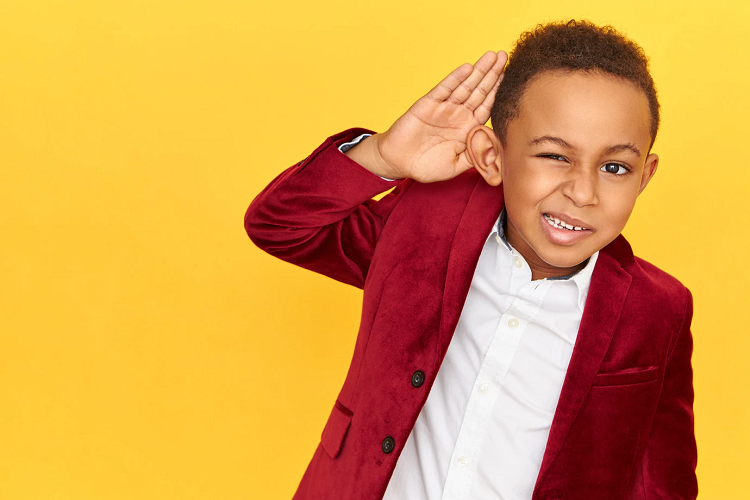Some children suffer from hearing loss and it is important to know the signs of hearing loss in children to avoid negative impact on their lives. Let’s understand how you know if a child has a hearing loss problem.
As a parent, one of your top priorities is ensuring your child is healthy and happy. Yet, one aspect of their health you may not think about as often is their hearing. Many parents don’t realize that there are early signs of hearing loss in children. Getting them checked out is essential if you think there might be a problem.
To help you determine if your child has any hearing issues, we’ve teamed up with Hear & Say to give you the information you need.
10 Signs Your Child May Have a Hearing Problem

Parenting is all about being observant and knowing your child. Here are some of the signs that could state a hearing loss:
1. Child Doesn’t Respond To Sounds
It sounds like your voice or beeping noises should get your child’s attention, but if they don’t react, it could be a sign of hearing loss.
When you observe your child’s reactions, pay attention to how they respond to different tones and pitches. If you think something is wrong, it’s best to get your child checked out by a professional.
2. Child Doesn’t Babble or Make Cooing Noises
Babies typically start making cooing noises around two months old. If your baby isn’t making these sounds, it could be a sign of a hearing loss. It is especially true if your child doesn’t start making other noises like laughing or crying.
3. Child Isn’t Using Gestures
By eight months, most babies will start using gestures, such as waving, pointing, or communicating. So when you see that your child isn’t using any gestures, it could be a sign that they have difficulty hearing.
Talk to your child’s doctor if you think they aren’t using gestures as much as other babies their age.
4. Child Isn’t Saying Any Words by 12 Months Old
Most babies will say their first word around 12 months old. If your child isn’t saying any words by this age, it could indicate that they have difficulty hearing.
Expect to hear more than one word by 18 months old; if you don’t, it may be a sign of a hearing issue.
5. Child Says “What” or “Huh” Often
If you have to repeat yourself often when talking to your child, it’s a sign that they may not hear you correctly. Grown-ups often say “what” or “huh” when they don’t hear something, and the same behavior may be a sign in younger children.
6. Child Turns the Volume up on the TV or Radio Often
If your child frequently turns up the volume on the TV or radio, it could be a sign that they have difficulty hearing softer sounds. Pay attention to the volume your child sets and talk to them about why they need it louder than average.
It is especially true when it comes to ordinary conversations with your child. For example, if you have difficulty hearing them, it could be a sign of a hearing problem.
7. Child Has Trouble Understanding and Following Directions
It is hard for any child to follow directions, but if your child has more difficulty than usual, it may be a sign of hearing loss. Pay attention to your child’s ability to understand and obey instructions and talk to their doctor if you have any concerns.
8. Child Fails School Hearing Tests
Many schools perform hearing screenings for their students. If your child fails these tests, it could indicate a hearing problem. Talk to the school and request that they perform more comprehensive tests if you have any concerns.
9. Child Speaks More Loudly Than Other Children Their Age
If your child speaks much louder than other children their age, it could be a sign that they are having difficulty hearing softer voices. Talk to their doctor and request an evaluation if you think this may be the case.
10. Your Child Avoids Noisy Places
Suppose your child seems to avoid places with a lot of background noise, such as the playground or busy stores. This could be a sign that they have difficulty hearing in loud environments. Pay attention to their behavior and ensure that they get their hearing tested if they have any concerns.
Final Thoughts
The best way to determine if your child has a hearing problem is to get tested by an audiologist. An audiologist can perform a series of tests to measure the level of hearing loss and provide you with treatment options. Don’t delay getting your child checked out if you suspect they have difficulty hearing. Early detection and treatment can make a big difference in their development.
Have you noticed any signs of hearing loss in your child? Get in touch with an audiologist today to ensure your child can listen to and communicate effectively. With the proper care, they can make big strides in their development!



